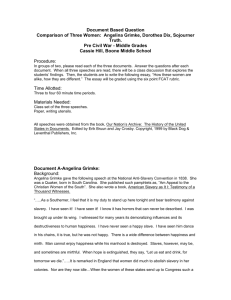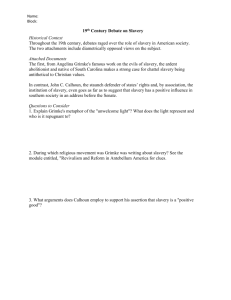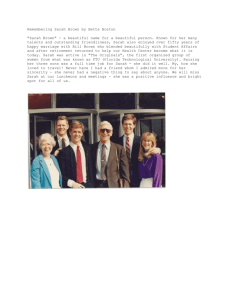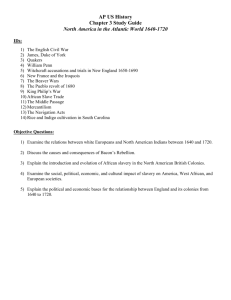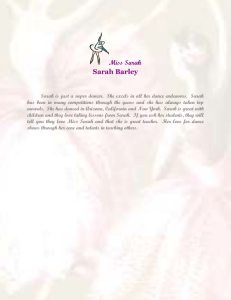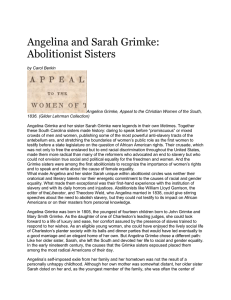Rebecca Smith - Hamilton-Class-WIKI
advertisement
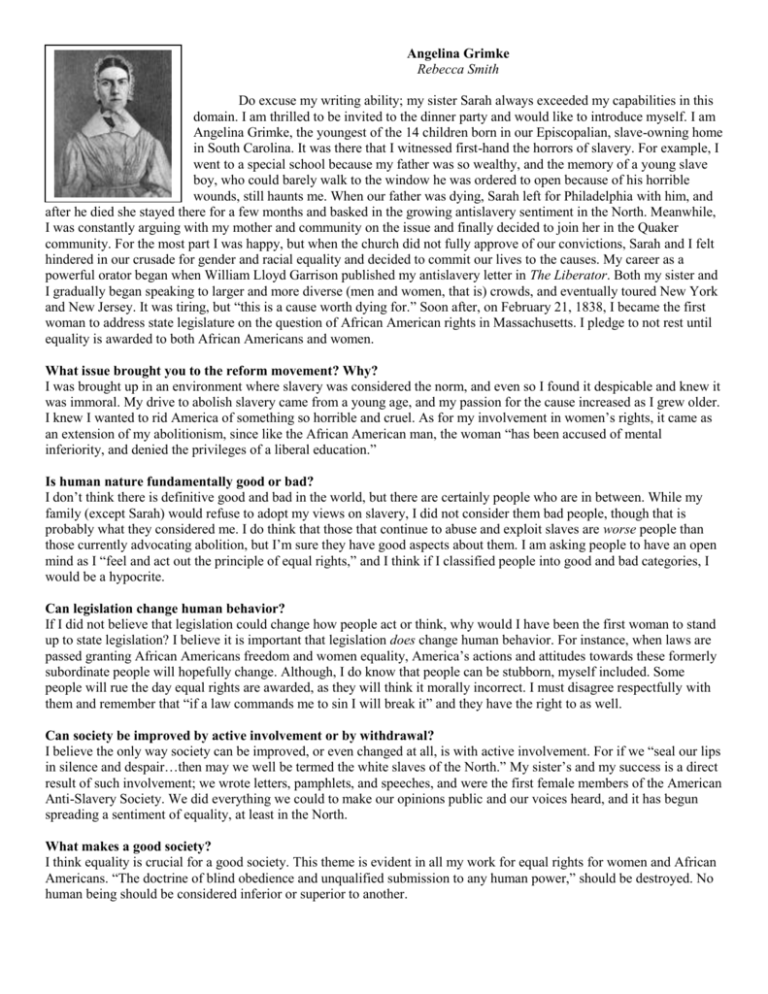
Angelina Grimke Rebecca Smith Do excuse my writing ability; my sister Sarah always exceeded my capabilities in this domain. I am thrilled to be invited to the dinner party and would like to introduce myself. I am Angelina Grimke, the youngest of the 14 children born in our Episcopalian, slave-owning home in South Carolina. It was there that I witnessed first-hand the horrors of slavery. For example, I went to a special school because my father was so wealthy, and the memory of a young slave boy, who could barely walk to the window he was ordered to open because of his horrible wounds, still haunts me. When our father was dying, Sarah left for Philadelphia with him, and after he died she stayed there for a few months and basked in the growing antislavery sentiment in the North. Meanwhile, I was constantly arguing with my mother and community on the issue and finally decided to join her in the Quaker community. For the most part I was happy, but when the church did not fully approve of our convictions, Sarah and I felt hindered in our crusade for gender and racial equality and decided to commit our lives to the causes. My career as a powerful orator began when William Lloyd Garrison published my antislavery letter in The Liberator. Both my sister and I gradually began speaking to larger and more diverse (men and women, that is) crowds, and eventually toured New York and New Jersey. It was tiring, but “this is a cause worth dying for.” Soon after, on February 21, 1838, I became the first woman to address state legislature on the question of African American rights in Massachusetts. I pledge to not rest until equality is awarded to both African Americans and women. What issue brought you to the reform movement? Why? I was brought up in an environment where slavery was considered the norm, and even so I found it despicable and knew it was immoral. My drive to abolish slavery came from a young age, and my passion for the cause increased as I grew older. I knew I wanted to rid America of something so horrible and cruel. As for my involvement in women’s rights, it came as an extension of my abolitionism, since like the African American man, the woman “has been accused of mental inferiority, and denied the privileges of a liberal education.” Is human nature fundamentally good or bad? I don’t think there is definitive good and bad in the world, but there are certainly people who are in between. While my family (except Sarah) would refuse to adopt my views on slavery, I did not consider them bad people, though that is probably what they considered me. I do think that those that continue to abuse and exploit slaves are worse people than those currently advocating abolition, but I’m sure they have good aspects about them. I am asking people to have an open mind as I “feel and act out the principle of equal rights,” and I think if I classified people into good and bad categories, I would be a hypocrite. Can legislation change human behavior? If I did not believe that legislation could change how people act or think, why would I have been the first woman to stand up to state legislation? I believe it is important that legislation does change human behavior. For instance, when laws are passed granting African Americans freedom and women equality, America’s actions and attitudes towards these formerly subordinate people will hopefully change. Although, I do know that people can be stubborn, myself included. Some people will rue the day equal rights are awarded, as they will think it morally incorrect. I must disagree respectfully with them and remember that “if a law commands me to sin I will break it” and they have the right to as well. Can society be improved by active involvement or by withdrawal? I believe the only way society can be improved, or even changed at all, is with active involvement. For if we “seal our lips in silence and despair…then may we well be termed the white slaves of the North.” My sister’s and my success is a direct result of such involvement; we wrote letters, pamphlets, and speeches, and were the first female members of the American Anti-Slavery Society. We did everything we could to make our opinions public and our voices heard, and it has begun spreading a sentiment of equality, at least in the North. What makes a good society? I think equality is crucial for a good society. This theme is evident in all my work for equal rights for women and African Americans. “The doctrine of blind obedience and unqualified submission to any human power,” should be destroyed. No human being should be considered inferior or superior to another. Rebecca Smith Works Cited “Angelina Grimke.” Peace Garden. 2004. California State U, Fresno. 19 Nov. 2008 <http://www.csufresno.edu/peacegarden/nominees/grimke.htm>. Berkin, Carol. “Angelina and Sarah Grimke: Abolitionist Sisters.” History Now: American History Online. 2005. The Gilder Lehman Inst. of American History. 19 Nov. 2008 <http://historynow.org/09_2005/ historian4.html>. “Women’s History: Sarah Grimke, Angelina Grimke.” Gale Cengage Learning. 1996. 19 Nov. 2008 <http://gale.cengage.com/free_resources/whm/bio/grimk_sisters.htm>.

